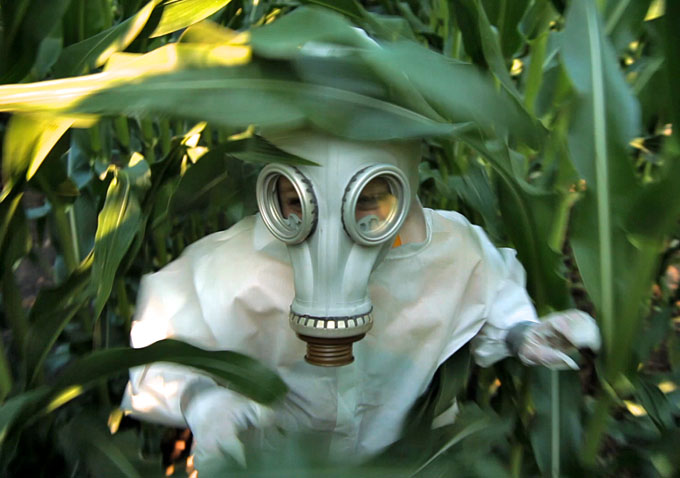
There are moments in “GMO OMG” that feel a little bit like “Jaws” and “Psycho.” What those films did for the beach and the shower, this documentary from Jeremy Seifert could do for the grocery store for those who are easily persuaded. We left the movie stressing out over what we could eat for dinner that wouldn’t leave us riddled with tumors in 10 years. The film posits that even Whole Foods isn’t safe from the plague of the titular evil, with the documentary calling out the supermarket giant for stocking processed foods with GMOs.

As “GMO OMG” explains, GMOs are genetically modified organisms: plants and animals that have been genetically engineered for certain qualities, such as being resistant to pesticides. Director Seifert gets drawn into the world of GMOs by his young son’s interest in seeds, starting his investigation into what they are and how they might affect his family and the world around them. With the bulk of seeds in America being produced by a handful of chemical companies such as Monsanto, Dow and DuPont, most of our food falls into this category. Since GMOs have really only been around for a few decades, there have been limited long-term studies around their effects on the human body and on the environment. In addition to interviews with farmers, politicians and scientists (and plenty of scenes with the cute Seifert clan), the documentary spends some time on the Seralini study, which links GMOs to tumors in rats, pointing to the possible dangers of experimenting with and patenting nature. It also looks at Monsanto’s efforts to give their seeds to Haitian farmers after the 2010 earthquake and their initially surprising reaction.
Since Seifert’s efforts to contact companies like Monsanto were less than successful, “GMO OMG” is a largely one-side film. There are some supporters of GMOs in the movie, mostly represented by farmers who raise traditional crops. Those who back GMOs tout their increased crop yields, particularly around the idea that you couldn’t feed the world with just organic farming. Seifert’s interviewees counter the argument, saying that while GMO crops are more productive in early years, organic farming comes out ahead after years of use. There’s plenty of debate both within the film and around GMOs in general, and “GMO OMG” is persuasive in its anti-GMO crusade, particularly in its casting of corporations as the big bad, who threaten to sue states who proceed with labeling products that contain GMOs. It positions farming as a largely corporate enterprise, moving ever further away from the more traditional single-farmer model of decades and centuries past. Regardless of your opinion on GMOs, the most sobering statistic here may be that America has fewer farmers than prisoners.

While “GMO OMG” is entertaining and informative, a few problems gave us pause in fully committing to its ideals. This is a highly personal film for Seifert who examines a global issue from the perspective of his family, a tactic that helps bring the audience closer to the story. The idea for the film seems to have grown from his oldest son’s obsession with seeds, and Seifert’s adorable kids are frequently shown throughout the movie and inject it with its humor and heart. The moment that made us cringe was one where he made his children wear hazmat suits to run through a cornfield. In a very staged scene that feels about as natural as genetically engineered seeds, he juxtaposes a once carefree activity with one theoretically fraught with toxins that needs industrial-grade protection. It’s also somewhat troubling that he’s using his kids to make a point in a way that feels manipulative for both his family and the audience.
Overall, “GMO OMG” is a beautifully shot film that benefits from both nice lensing from Rod Hassler and images of American farmland. With the cinematography and its family-centric approach, it takes what could have been a dry subject and broadens its appeal. Like any documentary, it can’t be a comprehensive study on its subject, though it certainly piqued our interest to look more deeply into the issue. [B]

